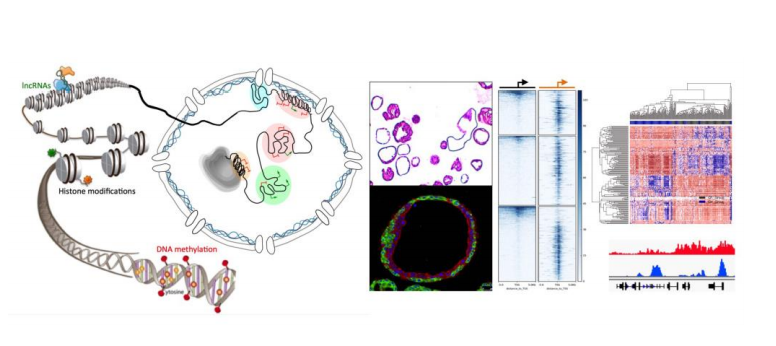Research Group Rafaella Santoro
Keywords
Epigenetics, cancer stem cells, prostate cancer
Summary & Mission statement
Our lab aims to elucidate the contribution of epigenetic and chromatin alterations in prostate cancer. Our mission is to implement personalized medicine in prostate cancer through the identification and functional characterization of key genes and pathways that will serve for the discovery of prognostic markers of disease outcome, predictive biomarkers for drug response and targets for efficient therapy.
Overview
rostate cancer (PCa) is the second leading cause of cancer death in men. PCa has a clinically heterogeneous phenotype, with some men having indolent features that can be monitored without therapeutic intervention, or highly aggressive disease that requires intervention. The heterogeneity of PCa is underpinned by a heterogenous molecular landscape and this complexity makes PCa still resilient to classification into molecular subtypes associated with distinct disease outcomes and response to therapy. Recent advances in genomic technologies revealed several genomic rearrangements and epigenetic alterations in human PCa specimens. However, these data alone cannot help to assess biomarkers of drug sensitivity since drugs against PCa cannot be tested effectively other than in clinical trials due to the lack of in vitro PCa models. Our lab is currently developing organoid technologies to establish PCa models that reproduce PCa heterogeneity. Moreover, our research aims to understand the impact of alterations in epigenetic and
chromatin regulatory processes in order to determine the critical pathways linked to aggressive disease. The results generated from these projects will be an important step towards precision medicine of PCa since it will allow the identification of key genes and pathways altered in each PCa type that will serve for the discovery of prognostic markers of disease outcome, predictive biomarkers for drug response and targets for efficient therapy, and the establishment of new therapeutic strategies to target the critical cell population resistant to conventional treatment regimens.

